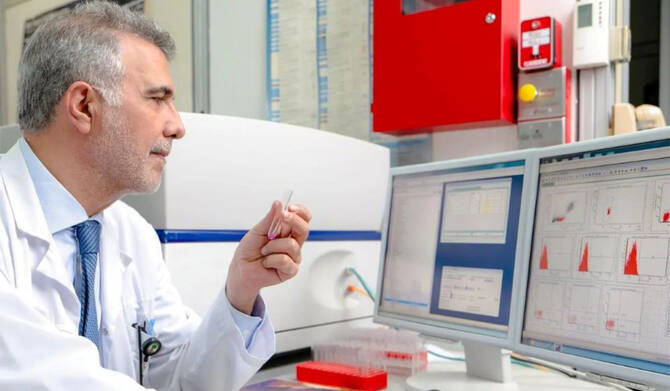
- ARAB NEWS
- 22 Aug 2025

JEDDAH: The liver plays a central role in keeping our bodies healthy. It filters toxins, supports digestion, stores energy and essential nutrients, and helps the body fight infections.
The major concern with liver diseases, however, is that they are often silent killers. The progression is very gradual, and most patients experience no symptoms, leaving them unaware of their condition. This makes awareness and early detection vital.
This is a national health priority for Saudi Arabia’s Ministry of Health, which is focusing on preventive care.

Protecting liver health means preventing long-term complications and improving the quality of life for millions, contributing to the ministry’s targets to improve healthy life expectancy, in line with Vision 2030’s goal of creating a vibrant society.
In an exclusive interview following World Liver Day on Saturday, Dr. Abdullah Assiri, the deputy minister for population health, said that viral hepatitis — especially hepatitis B and C — has been a long-standing concern and is responsible for many cases of chronic liver disease, cirrhosis, and liver cancer.
He said: “In Saudi Arabia, the hepatitis C virus has caused the most cirrhosis, decompensated cirrhosis, and liver transplants.”
Hepatitis is essentially an inflammation of the liver caused by different viruses — types A, B, C, D, and E — each differing in how they spread, how severe they become, and how they are prevented.
Assiri added: “The challenge with hepatitis is that up to 95 percent of people living with the infection globally are unaware they have it, because the illness can remain silent for years.
“In terms of early warning signs, these can be quite vague, including fatigue, abdominal discomfort, or mild jaundice, but there are often no symptoms at all until the disease is advanced.”
Assiri explained that the main reason why liver conditions go undiagnosed until the later stages is that the liver is a remarkably resilient organ.
It continues to function well, even when partially damaged. Unfortunately, by the time symptoms like swelling, jaundice, or digestive issues appear, the disease may have already progressed to cirrhosis or liver failure.
He said: “Late detection can lead to serious consequences, including irreversible scarring of the liver, liver cancer, and life-threatening complications.
“That’s why we strongly recommend that people, especially those with risk factors such as obesity, diabetes, or a family history of liver disease, undergo regular check-ups and screenings.”
Lifestyle is everything when it comes to liver health. Poor diet, lack of physical activity, and smoking all put extra pressure on the liver.
Though alcohol-related liver disease is less prevalent in the Kingdom, other lifestyle factors, like unhealthy eating habits, along with viral hepatitis, play a larger role.
He said: “The good news is that the liver has an exceptional capacity to heal if given the right care. Even early-stage damage can often be reversed through lifestyle changes. I have personally witnessed patients transform their health by adopting better habits.”
As a medical professional Assiri always recommends lifestyle changes centered around four key pillars: nutrition, sleep, relaxation, and exercise. These are all vital to maintaining a healthy liver, as are hepatitis vaccinations.
At the national level the Ministry of Health is tackling liver diseases through policies that focus on prevention, early detection, infection-control practices in healthcare, and effective treatment.
Assiri said: “A major milestone in the national strategy was the introduction of direct acting antiviral medications in 2014, which marked the beginning of an ambitious nationwide effort to eliminate hepatitis C.
“Data shows that a comprehensive program combining targeted screening, aggressive treatment of around 8,000 patients per year, and strengthened prevention strategies could see this disease eliminated in Saudi Arabia by 2030 — or even earlier.
“Eliminating hepatitis C would save an estimated 3,000 Saudi lives and SR10 billion ($2.6 billion) in healthcare costs.
“Importantly, this elimination program also enables broader screening initiatives for other ‘silent killer’ diseases such as hepatitis B, diabetes, hypertension, obesity, and dyslipidemia — allowing us to implement early preventive health interventions on a national scale.”
He added: “Our progress has been substantial. We met our 80 percent treatment coverage targets in 2023, are on track to reduce mortality by 65 percent by 2025, aim to diagnose 90 percent of cases by 2026, and are working to reduce new hepatitis C infections by 80 percent by 2030.”
These metrics reflect a robust public health response, and demonstrate Saudi Arabia’s strong commitment to leading by example in regional disease control efforts.
In addition to this, Saudi Arabia continues to be a leader in medical innovation and research in the field. For example, the world’s first robotic left liver lobe transplant was performed here, demonstrating the Kingdom’s commitment to world-class liver care.
The ministry has several initiatives underway. One of the key programs is premarital screening, which tests couples for hepatitis B and C to reduce the risk of transmission and ensure early intervention.
Additionally, it is expanding community screening drives, especially for high-risk groups, and enhancing access to affordable treatment for hepatitis C. In collaboration with health centers, the ministry continues to promote hepatitis vaccinations for adults who may have missed earlier immunization.
Assiri said: “Take care of your liver now, and it will take care of you for life. The liver is the largest and one of the most vital organs in the human body, yet it often doesn’t get the attention it deserves because symptoms of disease can be silent.
“I urge everyone to lead a more active life: eat healthier, stay hydrated, sleep, and get regular check-ups, especially if you have risk factors like diabetes or obesity.
“Get vaccinated, and remember that small changes in your daily routine can make a big difference for your liver and your overall health.”